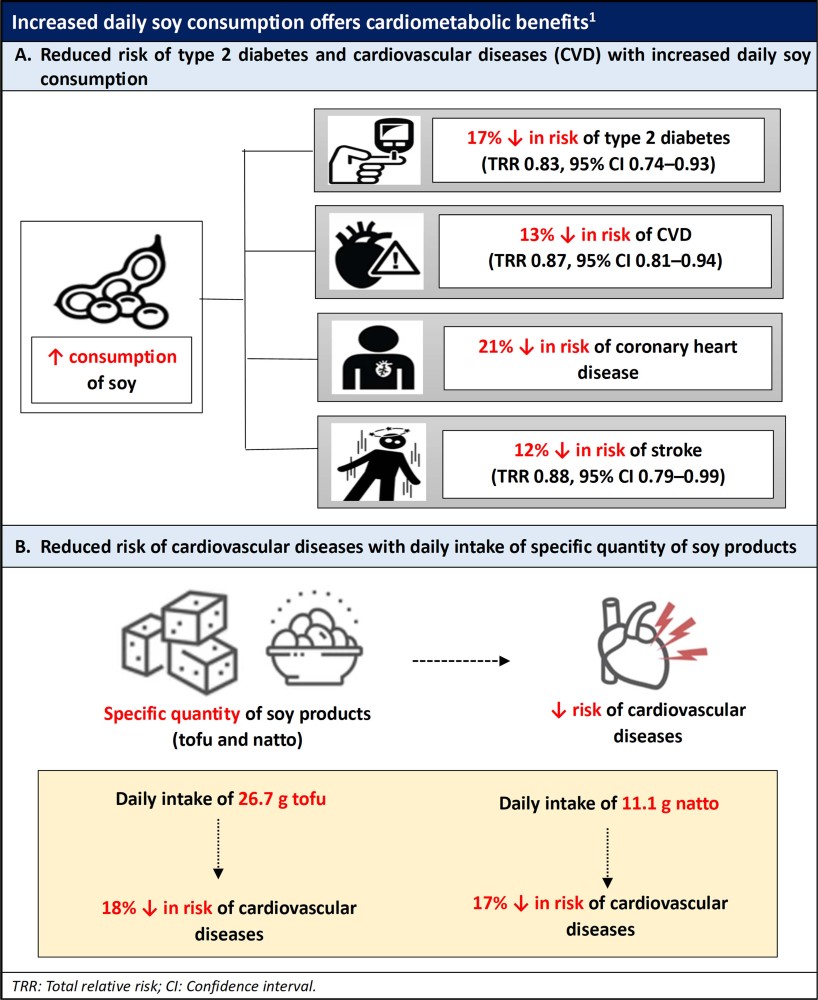
Soy is a rich source of plant protein. It is the only plant-derived complete protein source containing all essential amino acids present in animal proteins. Contrary to animal proteins, soy protein is devoid of cholesterol and has low contents of methionine and branched-chain amino acids, which are known to have a causative role in chronic cardiometabolic diseases. Soy proteins have been reported to improve lipid profile, diabetes, and CV health [1,2]. A study by Zuo et al., recently published in the journal “Nutrients”, reported that increased soy consumption decreased the risk of type 2 diabetes (T2D) and cardiovascular diseases (CVDs, including coronary heart disease [CHD] and stroke). Additionally, a specific quantity of soy products (for e.g., ~27 g of tofu) was most beneficial in preventing T2D and CVDs [1].
Dietary proteins are key nutrients obtained from animal sources (meat, fish, poultry, eggs, and dairy) and plant sources (soy, beans, lentils, and nuts). Increasing protein intake, especially plant-based proteins, lowers the incidence of cardiometabolic risk factors and improves cardiometabolic health due to its cardioprotective action [2]. Plant-based protein consumption is associated with better overall health outcomes, particularly CV health, and better prognosis related to cardiometabolic diseases compared to animal-based proteins[3].
This study was a systematic review and meta-analysis of 29 studies published from 2001 to 2021 including patients (n = 16,60,304; ≥18 years of age) with a total of 16,521 T2D events and 54,213 CVD events (stroke: 22,112; CHD: 12,906; others: 19,195) over the follow-up duration of 2.5–24 years. The study investigated the association between soy consumption and the risk of T2D and CVDs by calculating total relative risk (TRR; with 95% confidence intervals [CI]) using random-effects model for highest vs.lowest soy consumption category analysis of each study included in the meta-analysis. The study results are summarized below [1].
- The risk of T2D decreased by 17% in patients with highest soy consumption compared to those with lowest soy consumption (Graphic A).
- The risk of CVD decreased by 13% in patients with highest soy consumption compared to those with lowest soy consumption (Graphic A).
- Compared to low soy consumption, highest soy consumption decreased the risk of CHD events by 21% and stroke events by 12% (Graphic A).
- The risk of CVDs decreased by 18% with daily intake of 26.7 g tofu, and the risk of CVDs, specifically stroke, decreased by 17% with daily intake of 11.1 g natto (Graphic B). Non-linear significant relationships were noted between tofu consumption and risk for CVDs as well as natto and risk for CVDs, i.e., when the daily intake increased above the above-mentioned doses, there was no cardioprotective effect seen.
- Tofu (TRR 0.89, 95% CI 0.80–0.99) and natto (TRR 0.82, 95% CI 0.75–0.90) were negatively associated with risk for CVDs, i.e., increased consumption of both tofu and natto led to decreased risk of CVDs. Only tofu was negatively associated with CHD events (TRR 0.81, 95% CI 0.67–0.98) and only natto was negatively associated with stroke events (TRR 0.81, 95% CI 0.72–0.91).

Clinical implications [1]
- Soy consumption was found to be associated with the lower risk of T2D, CVDs, CHD, and stroke, emphasizing the importance of including soy in the diet.
- A specific quantity of soy products (26.7 g tofu and 11.1 g natto) was found to be associated with prevention of CVDs, which may further have implications on improving lifespan.
References
- Zuo X, Zhao R, Wu M, et al. Soy consumption and the risk of type 2 diabetes and cardiovascular diseases: A systematic review and meta-analysis. Nutrients. 2023;15(6):1358. Doi: 10.3390/nu15061358
- Zhubi-Bakija F, Bajraktari G, Bytyçi I, et al; International Lipid Expert Panel (ILEP). The impact of type of dietary protein, animal versus vegetable, in modifying cardiometabolic risk factors: A position paper from the International Lipid Expert Panel (ILEP). Clin Nutr. 2021;40(1):255-76.
- Ferrari L, Panaite SA, Bertazzo A, et al. Animal- and plant-based protein sources: A scoping review of human health outcomes and environmental impact. Nutrients. 2022;14(23):5115. Doi: 10.3390/nu14235115
